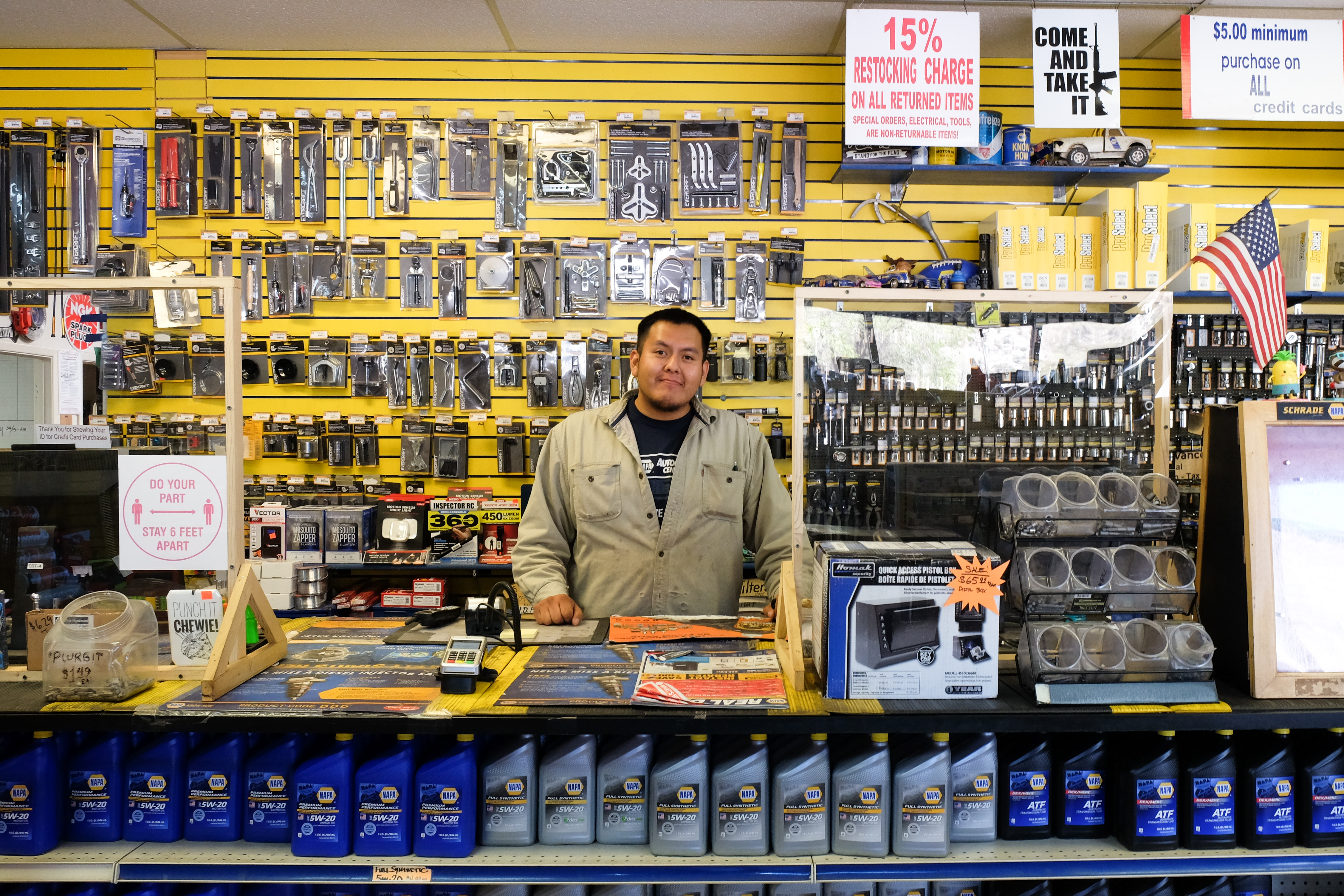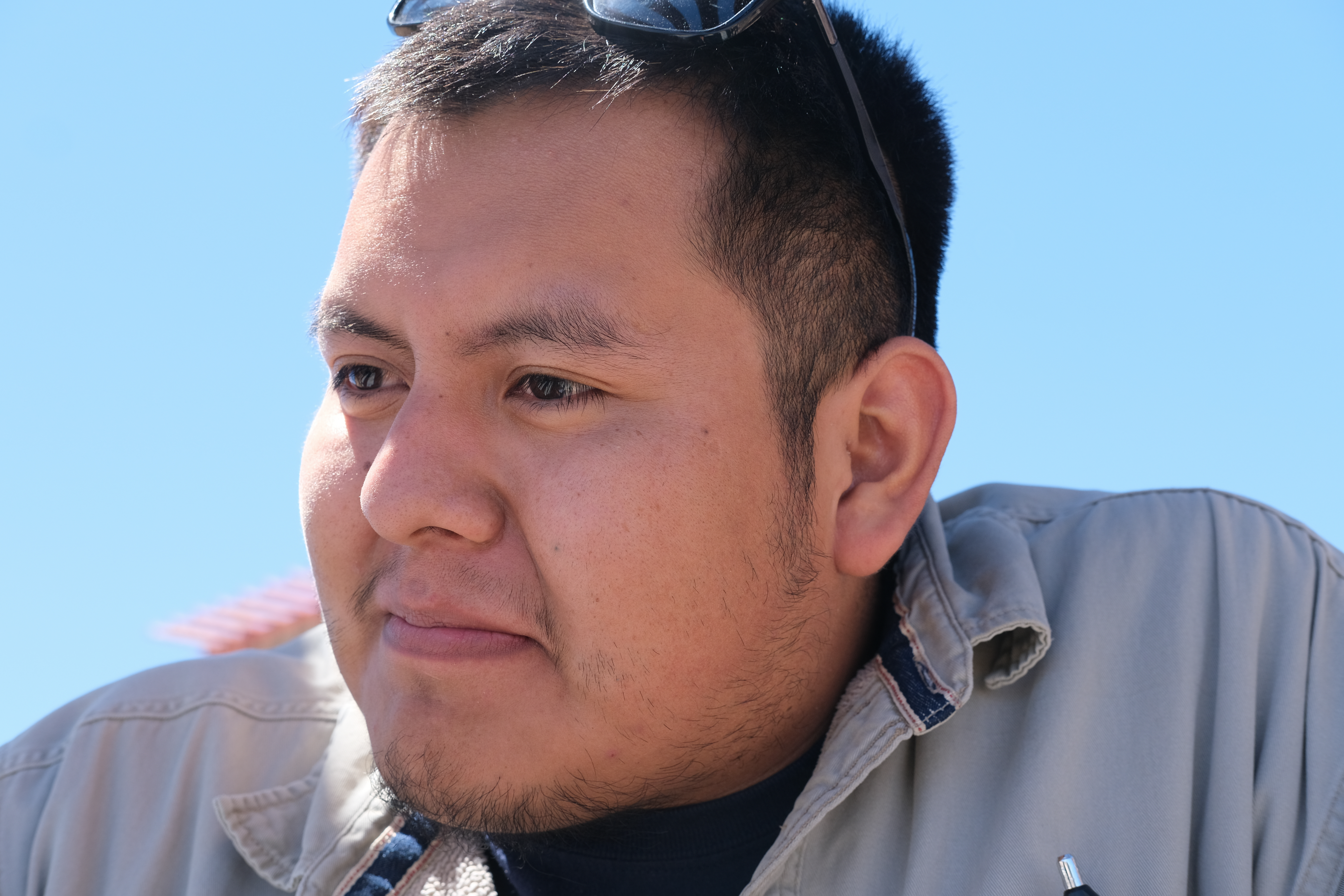‘I never thought I'd hear my pastor say stuff like that.’
Micah Estevan, 22 | Window Rock, Arizona

Podcast Transcript
Note: Alan and Max are both featured as interviewers. To distinguish Alan’s voice in the original interview from his narration of the podcast, we marked Alan(N) while narrating.
___
Alan(N): Political polarization in America has become especially pronounced in the past few years. During Trump’s presidency, the country saw a new wave of alt-right empowerment and insurgence. In this oral history we focus on how that’s seeped into religious leadership. More specifically, we learn about how political extremism coupled with the effects of the pandemic fractured the relationship between a young man and his pastor in Navajo Nation.
Max: “Yo, thanks so much for coming man. Micah, I really appreciate it.
Micah: “Yeah, no problem”
Micah: My name is Micah Estevan. I’m 22 years old. I’m a Native American living on the Navajo reservation.
Max: What area do you live in?
Micah: The coal mine area that’s just up right behind that hill over there [chuckles].
Alan(N): We met Micah at Yazzie’s Auto Parts as he was restocking shelves. The store is on the main highway just a couple hundred meters from the New Mexico-Arizona border. He’s a big, smiley guy, six foot four and dressed in his work uniform. Like many people living near Window Rock, religion played a part in Micah’s life from a young age. He grew up going to a tiny religious school called Wildcat Christian Academy where he later volunteered after graduating highschool.
Micah: It’s not pretty big. It’s almost like a one room school. It ranged from like 25 to 30, max 30.
Alan(N): He later switched to a public high school, where he was able to hear more diverse perspectives outside of his religious homebase.
Micah: For one thing, they weren’t always talking about God, Jesus and the Bible, that being the obvious. And I grew up in the church and in that school, so that mindset I had for about 12/13 years and no outside, I guess, influence or contact with anybody that thought differently than I did.
Alan(N): Native communities like Micah’s were affected disproportionately by the pandemic, with infection rates 14 times higher and a death rate 9 times higher than the rest of the country.
Micah: I was kind of angry at first cus when it came here. It was at a church service in Tuba City? I was kind of angry at them because somebody thought it would be a good idea to hold church service while they were sick. And at the same time, there I was, going to church that very Sunday when it came out that it was at a church service. How ironic.
With no running water, no hot water and no electricity… We got hit pretty hard. And even during work, one of my routes takes me past a grave, a graveyard, a veteran's graveyard. And like at the beginning... there'd be a funeral like every one or two days. Sometimes there'd be like three in a day. I don't, I wouldn't think I'd never see something like that. [Long sigh]. Who would’ve thought?
Alan(N): There were other less expected consequences as well – those that took shape in his religious community.
Micah: My pastor, the pastor I grew up with, I kind of saw his ugly side when he would become anti-authoritarian, saying that this was a way to hurt the church, stifling freedom, the First Amendment, and all of these crazy things when they were at first just trying to help. You know, trying to slow it. But my guess is that he was kind of cut from that cloth of anti-vaxxers and Christians who own guns. [Chuckles] I mean, I own a few. But it's just the way he made it sound. I didn't care to go after that.
Alan(N): Micah’s pastor has always talked politics, but this year felt really different.
Micah: Even before [COVID], he would talk about politics in general. That’s pretty much all he thought about. But at the beginning of the pandemic, it just kind of took an ugly turn. It became more political than it should’ve. It really did. I mean, every Sunday wouldn't be a message on forgiveness, loving one another, helping the poor, helping other people. It was just about the lockdowns and the president, the Democrats.
He would mix it in with his message, say stuff like the government can’t do this. They can't take away our First Amendment rights. Even though it wasn't about that. The Democrats were terrible. He would even be as bold as to say that if he could save people, he would take a bat and hit em over the head with it, that they all needed to be killed. He would say stuff about Nancy Pelosi and Chuck Schumer – saying that they were witches. They had to be killed and whatnot...I don’t know. I never thought I'd hear my pastor say stuff like that, especially now. I think with the former president being in office, it kind of emboldened him to say more radical stuff like that, even if he had these things, but didn't really say it... I think you could say that goes for some of the pastors around this country.
Alan(N): Micah noticed that his pastor didn’t start preaching extremist messages all of sudden. Trump’s presidency normalized alt-right politics over the course of his term and emboldened pastors like Micah’s to change their rhetoric. When the pandemic hit, all kinds of conspiracies started influencing the pastor, some even calling for violence. So why doesn’t Micah just change churches?
Alan: Have you thought about going to a different church?
Micah: I did, but... I don’t know, I'm kind of afraid that they’ll be the same way. So I’m kind of weary now of the churches.
Alan(N): Not only that, Micah and his family have a long and complicated relationship with the pastor.
Max: What’s your parents’ relationship with the pastor?
Micah: Pretty much the same as mine. They don’t like to hear him talk, but I guess they can’t end that type of relationship with him because at the beginning, before I was born, he would help my mom and dad out. It’s kind of a love hate relationship. We love him at times, and then we hate him at other times.
Alan: How did he help your parents?
Micah: Just by getting stuff when I was a baby: diapers, food, milk. I kind of, well, I grew up without electricity and running water. We have running water now. It’s just we’re working on electricity. So those were some of the things that I didn’t have. I didn't really know I thought that was normal. He provided a tank, so that way the water would come down using gravity, like a gravity feeder. Getting help from other churches to build my brother and I our room. And giving out money when we needed help.
Alan(N): Micah’s pastor is almost like family to the Estevans. The way Micah describes him, it’s like he’s that unbearable uncle or cousin you’ve known since childhood. It’s hard to just end that kind of relationship.
Micah: In a way it was kind of like a grandfatherly relationship. I kind of called him that a few times. I didn't really tell him like hey, Grandpa, and whatnot. But in a way, he seemed like that to me at the time. Because I didn't really know my grandparents growing up. I mean he’s pretty old. He’s that fiery Southern Baptist type.
Alan: Is he from the South?
Micah: He’s from West Virginia.
Max and Alan: And is he native?
Micah: No, he’s white [chuckles].
Alan: Is the church mostly native?
Micah: Oh yeah, it’s mostly Native. A few of his daughters are the only ones that are white, but it’s mostly native, older native people. There’s not a whole lot of young people in the church anymore. I started taking note of that. But it’s mostly older people.
Alan: Is it weird to have a white pastor?
Micah: Mmm, not really. I mean, I grew up with that. So I didn't really think much about it. I grew up with him. I mean, I grew up with him. I've heard him talk, I heard him speak, even pick me up from school because I asked him to because I kind of missed the bus. So I don't really think his race had anything to do with his politics, or how I viewed him. Every once in a while he’ll say a few racist things. But he’s not really a supremacist or a white supremacist.
Max: What’s some of the racist stuff he’ll say?
Micah: He’ll make jokes about black people, call them the N word I mean just… really blatantly. He’ll say stuff about Mexicans, Asians. He doesn’t think there are Christians in Asia.
Max: Does he ever say anything about the Navajo people?
Micah: Yeah, he does – We’re lazy, we’re drunks. I mean, I wouldn't hear anybody talk back or at least push back and say, hey, maybe we shouldn't be saying these things. And that was the unfortunate part. I didn't have the guts to say anything. I mean, they really wouldn’t say anything. They would either nod their heads up and down, like they're agreeing with them. Or saying, “Amen” [deep southern accent].
I’ve never confronted anybody. I’ve just stuck to the side and held these views in.
Max: If you could say something to your pastor about what’s going on during the pandemic what would you say?
Micah: I think I would tell him that not everybody’s out to get us. He shouldn't demonize people because of their affiliation with other religions or if they're not religious or their politics. I mean, there's some Christians who are Democrats, Christians who are gay and whatnot. I think he has this apocalyptic mindset. And I think that's the reason why he does all the things he does. I would tell him to read, at least read the words very carefully in the Bible from where he gets all his material from for sermons. And actually think about these things.
I haven’t really talked to anybody other than you guys. I know you’re just letting me talk. But this is the most I’ve talked in a while.
Max: Do you think going forward you’re gonna continue to drift away from your pastor?
Micah: I mean, I haven’t talked to him in a while. It’s just, I don't know. It’s his mindset, it’s unhealthy! I kind of made it a rule to myself, subconsciously, that I wasn't gonna be around people that wouldn't listen, or at least hear a different perspective. And that's kind of hard now because people don't want to listen anymore.
Alan(N): Almost four months have passed since we met Micah in April of 2021 and he hasn’t returned to church since. For now, he’s transitioned to a personal religious exploration by reading authors like Fyodor Dostayevski and Shusaku Endo. Micah especially likes Endo’s work because he can relate as a religious outcast. For now, he’s uncertain if he’ll ever return to his church again.
Micah’s oral history is part of a larger project called Generation Pandemic, which focuses on the experiences of young adults in America and how the pandemic is shaping their lives. To read more stories like Micah’s please visit generationpandemicproject.com or follow the instagram page @generationpandemic_. Thanks for listening.
Window Rock, Arizona
Interview Date: April 29, 2021

